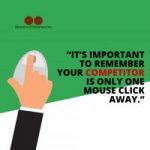In this tough economic climate, it is extra difficult for small businesses to market their business effectively. So, we have asked the insightful CarolRoth.com contributor network of business owners, experts, advisors and entrepreneurs to share their best tips to help small businesses market their business, products and services in tough economic times. Their answers are presented below, in no particular order.
You may notice some similar ideas listed, but I kept them separate, as something in the way one is framed may resonate differently with you.

1. Build Everything for Avatar #1
Get crystal clear on your customer avatars and think about what would appeal to them with every move you make. But, you must also decide which avatar is your primary focus. You can still do business with clients who aren’t perfect matches for that avatar, but your marketing and branding should be geared toward that primary profile. The better you are able to speak to that avatar, the more likely it is that the client will trust you enough to even consider responding to your marketing.

2. Your Community Wants to Help!
Small businesses should tap into NextDoor. Nextdoor is a free & private social network for neighborhoods, and it's an excellent way for small businesses to market their products or services to neighbors at no cost.
When people see that their friends and neighbors are using and enjoying your products or services, they're more likely to use them. The word of mouth marketing establishes a level of brand affinity. When you combine these strategies, a powerful feedback loop is developed.

3. Stand Out From the Noise!
Find something that makes your marketing special by skipping overplayed ideas.
For example, in July, everyone uses the Independence holiday as a theme for promos. People get bored of seeing the same thing and are more likely to skip over your ads. Instead, do something unique by incorporating the other holidays in July-- it's National Grilling Month & National Family Reunion month.
Send your ads when saturation is low, like the end of the month, and you'll stand out!
Thanks to: Brandon Adcock of
Nugenix.

4. Low-Cost, But High Value
Video marketing is a cost-effective way to demonstrate your brand personality while creating a personal connection with your audience. People love getting to know the people and story behind their favorite products. Regularly posting short-format videos highlighting your brand's roots, products, and CSR initiatives weaves a compelling narrative that takes your audience along on your journey. And by creating these videos on your smartphone, you save money and keep your content authentic.
Thanks to: Maria Shriver of
MOSH.

5. An Offer They Can't Refuse
Run a promotion. During difficult economic times, consumers don’t have surplus cash. To market your business, it’s wise to offer a special sale or promotion. People are looking for deals. Stand out from your competition with an attractive offer they can’t refuse.

6. The Best Marketing is Free
We believe that public relations is the best form of marketing, outshining SEO and advertising by a long shot. And, it's free! If you can get a journalist to see value in what you are pitching, then you just got what could have costs thousands of dollars in marketing fees without paying a dime. Plus, a news article in a high-ranking publication will give your SEO a huge boost, even if it's just a brand mention.

7. Work with Micro-influencers
Micro-influencers are not only more affordable than macro-influencers — their audiences are also hyper-engaged (according to HubSpot). Research shows that results from influencer marketing are on a steep upward trajectory. Working with a well-known person to promote your brand has the large potential to amplify your marketing efforts.

8. Bootstrapped Content Marketing
Write down every single question you've ever gotten and answer it on your website. At the end of the day, the small business owner is the subject matter expert in YOUR region. Answering every question you've ever gotten from customers and publishing them on your website will boost your SEO, and also build trust with your audience.
This is a long-term play that will play out in 6 - 9 months, but it's free besides the invested time to create and publish the content.

9. Use User-Generated Content
Using video reviews and how-to tutorials from your customers adds a more familiar, relatable face to your brand without the costs of hiring professional videographers. In tight economic times, your customers are the most authentic and cost-effective resources you have to put your content at the front of your leads' social media feed. People don't usually care for perfection with marketing---they much rather see visuals that hit home for them and encourage them to make the same purchase.

10. Send & Hand Sign Holiday Cards
As a local florist who spends six figures on advertising, the $1000 we spend on holiday greeting cards gets our biggest return. Each one is hand signed by the entire staff and the feedback is enormous.

11. Stay Connected and Consistent
Staying connected with your current customers during a downturn helps ensure that they remain loyal. It's more affordable to retain customers than attract new ones, especially during a bad economy. Be consistent with your engagement with them so they won't forget about you. They may not buy from you today, but they can refer you to others through word-of-mouth marketing. That's even more powerful.

12. First...Start Using This Math!
Marketing Tip #1: FIRST...Read this booklet about some very essential marketing math I developed that can help all kinds of businesses, large and small, make a lot more money...in good times and in bad.
The math is called “The Barrows Popularity Factor.”
The math will give you more of the information you need to make key marketing decisions with far less risk...and businesses of all kinds can use the math to help them increase their sales, increase their profit and decrease their risk.

13. Google My Business
When it comes to marketing, it pays to be in the place where people will be searching for your product/service. And most people this day in age use the internet to search for what they need. Google is by far the leading search engine and so making sure you have a complete Google My Business listing will help customers find you.

14. Leverage Social Media for Free
Lean into the power of social media. To market your business during an economic downturn, post frequently on all of your social media channels. It’s free to post images, videos, fun facts, and engaging content. These posts will garner interest and ultimately, sales.

15. Become Their Favorite Teacher!
When times are tough, we tend to become a bit more cautious about who we'll give our hard earned dollars to. This is the perfect time to focus on building TRUST by helping clients solve the problems they are also facing in today's markets. Educate your audience on the ways your product or service improves their lives and their pocketbook. The more they learn from you, the more they trust you. And the more they trust you, the more willing they are to initiate a transaction.

16. Newsletters & Blog Posts
One of the things I do to market our services is to regularly send out newsletters and blog posts on different topics that are helpful to potential clients. These are not fluff pieces, but instead give real value without any cost. Of course, once people see the valuable content, I hope that they continue to explore our website and sign up for our paid services as well.

17. Write a Book - Even an eBook!
When you're an author, you're an expert!
Your book doesn't have to be long to be impactful. It doesn't even have to be printed, although you should definitely make both a paperback and eBook, if possible.
Demonstrate your expertise with case studies where you solved problems just like the ones your clients experience. Be the expert you are - and land speaking & podcast invitations - with a book that positions you as the best in your field.

18. Emotions Matter
In this tough economic time, more and more people are looking for a way to support people and businesses they can connect to emotionally. Folks are craving more of an intimate involvement with things that they feel are important. So, make personal customer service a major priority. And if you can tie into the desire to support American companies trying to do more manufacturing here, you have really hit a nerve. Bringing part of our industry back home means a lot to people and they love it!

19. Word-of-Mouth is Key
Encourage every customer to leave a rating and review when a purchase or service is completed. This is free marketing that contributes to a positive brand reputation and boosts your business's SEO and page rank.
Word-of-mouth is and always will be a top marketing technique. People trust the people around them. If previous customers have good things to say about your business, others will be more likely to choose your business as well.

20. Grow Your Biz with Gratitude
Genuine gratitude for current clients, those you have worked with, and those you hope to work with is one of the best and all-around lowest cost marketing strategies there is. Appreciation of the opportunity to serve and an appreciation for the clients who use their hard-won dollars to work with you is priceless yet costs nothing. The payoffs are also priceless: reduced client churn and exponential growth of referral business (Another low-cost tip for challenging economic times!).

21. Connect with Customers
Instead of viewing every new sale transactionally, value each and every customer individually. Make them feel appreciated, seen and heard before, during and after the purchase. Leverage newsletters and social media to continue to engage them. When one person has a good experience with your brand/company, they are highly likely to return for another purchase, as well as pass along their thoughts not only to friends/acquaintances, but will also leave positive reviews where it counts!

22. Essentials Are Essential
If you want to succeed at marketing your business when fewer people have extra money to spend, you have to prove that what you have is essential. Historically, businesses that deal with essential services and products have withstood economic downturns with success.
So, consider how to market your services or products as something that you can't live without. Customers have to believe that they need what you have. You have to sell them that you're necessary and not a luxury.

23. Re-optimize Older Content
You've probably written great content in the past. But most content drops in the search rankings over time, so if you want it to rank well, you need to revisit and revise it.
That includes updating statistics and data, of course. But you should also run it through an SEO content analysis tool such as Frase or Clearscope to see how it stacks up to the competition. They'll suggest semantically related keywords you're missing.
The bottom line: old content can create traffic if you refresh it.

24. Be a Consultant
If you are good at what you do (and I hope you are), market consulting services to those who are just getting into your industry. As a cosmetic chemist, I offer consulting on formulating to help new skin care businesses develop products. It is something that helps fill the gap during periods of slow sales and keeps me on top of trends.

25. I Provided Two Freebies!
I'm a writer and I got a tip to provide my readers with a free addition to my new novel "Finding Eden" so I provided TWO FREEBIES! I recorded a FREE pre-prologue story (about 5 minutes in length) as well as three FREE additional chapters (about 70 pages) and placed links to them both right in the book! It's "win-win" marketing, as it created extra listening/reading for purchasers of my novel, while I collected new addresses for my email lists.

26. Make It Feel Affordable
In a downturn, people tend to prioritize spending on essentials and cut back on purchases they view as a luxury. To combat this, try offering a promotion or discount for your product. This will help attract consumers who are shopping around for bargains and make returning customers feel like they're scoring a deal. By temporarily lowering a price point, you can keep consistent sales coming in, even during tough economic times.

27. Instant Influence!
Recently, I participated in a giveaway on Instagram. I've been slowly growing my following and working with an influencer certainly helped in several ways. First, photography. I got really cool pictures of MY product with influencers that had close to 2 Million followers combined of people that are my customer base. Also, I got an email list of all the people that participated in the giveaway which I can use to further market to and lastly, I increased my following by 2K in about 24 hours.

28. How Much Should Marketing Cost
Rather than trim your marketing budget, redirect it to avenues that give you more bang for your buck.
When the economy is down, it's tempting to cut expenses in the name of short-term savings, but if you’re serious about growing your business, you need to invest in your brand. Get creative and try new outlets so that you can increase exposure in new communities.
Reach out to a podcaster or blogger aligned with your brand goals for a spotlight.

29. Giveaways Generate Leads
Using giveaway marketing strategies generates new leads quickly at a cost you can choose. Giveaways can be promoted on social media to dramatically increase new leads to a business, usually offering prizes, merchandise, or trips in exchange for following, tagging friends, and signing up for a business’s email list. Follow up on this strategy with an email campaign aimed to convert new customers with discounts, perks, or other deals to guarantee some business in tough times.

30. Loyalty is Built on Trust
In a downturn, customer loyalty becomes extremely valuable as more people are willing to switch brands for the lowest prices.
This is the time to build up a loyal customer base and that starts with trust. Make sure your marketing efforts are focused on quality over quantity, and follow through on your promises.
Incentivize positive reviews by having excellent customer service and contacting previous customers to share their opinions.
Be a brand that customers don't want to leave.

31. Offer Something Different
For long-term success, companies must be able to change their strategies to keep up with the times. People's wants and needs shift along with the economy. To better serve your customers, focus on making changes to your products and services. Your clients will notice that you're not out of touch with what's going on in society, making it easier for you to promote your products and services during a downturn in the economy.

32. How Can You Help Them?
When planning your marketing strategy in a bad economy, you should try to connect with the people. If the economy is bad, we are all suffering and consumers are looking for a way to save money.
In your marketing message, you can create something that speaks to them. For example, can they save money by shopping at your store or using your service? Are you more affordable than competitors and are currently offering a special sale price?
Use the bad economy to your advantage.

33. Maintain Your Connections
During difficult economic times, you shouldn't completely disappear. Maintain contact with both your audience and your consumers, and stay true to the strategy you've laid forth. These days, staying in touch is made much simpler by the prevalence of the internet. You might publish recommendations on social media, send out regular email newsletters packed with informative information and pointers, and supply customers with up-to-date information regarding your company.

34. Increase Bandwidth to Thrive
If you want to survive during tough economic times, build bandwidth into your life. Your creativity is directly proportional to your bandwidth.
You've never needed creativity more than when every corner is cut and every penny is squeezed.

35. Go Organic
For small businesses, marketing can be expensive, mostly because they spend so much on ads, paid SEO campaigns, and more.
My advice to small businesses trying to market in a bad economy: go organic and try to spread the word through natural posts on social media, earned links (from opportunities like HARO, etc), and word of mouth. Avoid paid marketing campaigns for now and let the flow of natural marketing grow your brand until the economy is improved and you're in a better place to spend!

36. Incentivize UGC with Rewards
We use a rewards program to incentivize users to take actions that promote our business. We award discounts, perks, and free merchandise in exchange for points customers can accrue by performing tasks such as making a purchase, referring friends, or creating user-generated image or video reviews to share online. As most consumers use reviews and UGC to vet online businesses before making a purchase, this content greatly helps our business extend our reach and convert customers more efficiently.

37. Add One Thing
What's the one thing you can add to your services that will be an automatic "yes" for people? If your services are pricey, find something smaller to offer, and offer it to more people.

38. Be Personal in Your Approach
The online world can be very impersonal. Facebook posts are made up of cartoon memes, Tweets are generic, and Instagram photos are impractical. Where did the personality go in marketing campaigns?
Well, during difficult times, like COVID-19, societal uprises, and challenging economies, it’s the perfect time for businesses to be personal in their marketing campaigns.
Find a way to speak directly to the consumer and don’t ignore the issue we’re all facing, a bad economy.

39. Revisit SEO Marketing Strategy
One cost-effective marketing approach during harsh economic times is to revamp and optimize your digital marketing SEO strategy. All online businesses benefit from increased visibility on search engines like Google and many can secure backlinks using third-party platforms such as HARO to connect with journalists, bloggers, and other media sources. Leverage industry expertise and insights, advice, and other business information to earn backlinks that will help your website climb SERPs.
Thanks to: Jason Panzer of
Hexclad.

40. Focus on Grassroots Marketing
I believe that grassroots marketing is the best marketing strategy in a bad economy. A grassroots marketing campaign often starts with a small group that you market to in hopes of spreading your message to a much larger group. There is still a lot of value in word-of-mouth marketing. You can connect with like-minded business owners by joining a mastermind, association & expand your existing network.

41. Self Publishing
As online business owners, one of our biggest hurdles is credibility. Can people trust us to be the experts that we say we are? One way to prove your expertise and credibility is by self-publishing a professional quality book. This proves you are willing to work long and hard on the topic at hand, and that you've studied it profusely. It's also a great talking point on podcasts and in media interviews.

42. Contests are a Win-Win
We have been finding new and fun ways to leverage our social media for new marketing initiatives. For example, for our Father’s Day promotions, we held a contest on Instagram. We filled a cooler with candies and asked dads to guess how many candies were in there, and the dad with the closest guess would win a new cooler. Some dads posted fun pics of themselves along with their guesses. It was a great and fun way to drive customer engagement.

43. Don't Stop Doing What Works
Many people decide to cut back in certain areas when the economy turns bad and one of those things is often marketing.
Unfortunately, that's not the right move. Marketing is crucial in helping you overcome a bad economy and even rise above the potential harm this difficult economy can cause.
Lean into the marketing strategies that have worked in the past and use them to hopefully boost sales and fuel company growth.

44. Small Business Marketing Tip
Attempt a different approach.
Changing your marketing plan and experimenting with new technologies is never wrong. It is beneficial. Suppose you want to reduce your marketing expense. Perhaps you've been paying for sponsored social media advertising or Google advertisements. Switching to free and low-cost marketing tactics such as organic SEO and affiliate marketing can help you reach new audiences without breaking the budget.

45. There's Money in Your Me$$age
Being the youngest of 5 kids was a challenge to being heard. I learned it’s not what you say but how you say it!
The same goes for navigating a free-falling economy.
Having resurrected & shaped hundreds of stories since 2014, I became equipped with these Messaging 411/Crazy Phraseology techniques to stay top of mind so that I wouldn't get left behind:
* Demonstrate authority via transformative content
* Visual & sticky messaging
* Use stories, not sales sorcery
These still work.

46. Forget About Marketing
In times of uncertainty, businesses depend on their existing customers. Segment your buyers in order to prioritize the best targets, and reassure them of your stability and trustworthiness.
We have done exactly that when Google Analytics was declared non GDPR-compliant. Seeing so many freaking out, we developed a DFY solution to easily implement Matomo Analytics, and we gave it away for just $1. This way we give back to our community, which may even bring new leads for us by word of mouth.

47. Be Active on Social Media
Lean in to social media. When the economy is struggling, it's more important than ever to connect with your customers. Posting regularly on socials is a great way to stay at the forefront of their minds. It can also be beneficial to hold social media contests or promotions to expand your audience. During an economic downturn, more people are looking for deals. Contests that provide free products can be a great, low-cost way to drive attention and subscribers to your brand.

48. Speak Your Customers Language
Your customers are facing challenging times just like your business. When getting your message across, speak in terms that your customers can relate to. Don't be afraid of open dialogue, ask them what they need from you to see them through the upcoming recession and tailor your offering to suit them. When faced with financial woes, priorities change, not only in business, but in the life of your customers.

49. Invest In Your Message
During financially challenging times, many businesses slash their marketing budgets. Avoid this temptation and take a more opportunistic approach. Investing more on your marketing strategy during economic downturns can really pay off. As digital channels are quieter, your message will be heard loud and clear. At these times, you have a real possibility of significantly increasing your market share.

50. Make Sure Your Ad Spend Counts
Are you spending money you don't need to be spending? How would you even know? This can be tracked through your Google Ads conversion tracking portal. If this is set up to properly, the system will count conversions (phone calls, leads, emails, bookings, purchases), and thus, help you achieve proper bidding strategies (Maximum Conversions vs Maximum Clicks)... and target audiences & demographics properly. Overall, you would be able to get better results for a smaller budget.

51. Focus on Your Customers
Your customers are an essential part of your business. Make sure you focus on providing them with the best possible experience. If you take care of your customers, they'll likely stick with you despite the harsh economic times. Please keep it simple and focus on the essential aspects of your business. You don't need to spend a lot of money on marketing; all you need is effective marketing. You can provide value to your potential customers and solve their problems as a small business.

52. Be Competitive
When the economy is not exactly in perfect shape, but you still need your fledgling company to grow, you need to keep a close eye on the competition. Sun Tzu wasn’t wrong when he talked about keeping your enemies close. You want to know what your competitors are and aren’t doing. Look to exploit marketing channels they don’t utilize, and provide your customers with conveniences they won’t experience anywhere else. Prove you’re the better alternative.

53. Know the Trend!
Marketing a product changes per season and trend - it is important for the marketing staff to know what’s the buzz for us to effortlessly innovate a marketing strategy, something authentic. Knowing the trend means having an inspiration to come up with a new marketing plan.
Thanks to: Daisy Jing of
Banish.

54. Facebook, Google Remarketing
During a recession, you may have to lower your marketing budget, so every dollar counts. Remarketing on social media platforms like Facebook and Google Display to customers who have already visited your website may be an effective strategy for increasing revenue for your company. If you want to retarget visitors to your site, you may use remarketing campaigns to do so. Since someone viewed your site, you may presume they're qualified and interested.

55. Utilize Prior Results
In order to get the most bang for your buck, you and your team will have to focus on your limited marketing resources. Error is not an option, and the only way to figure out what works is to look back at previous data and analytics. As a result of these tools, you have access to performance data that you can use to make informed decisions about what should be eliminated and what should be kept.

56. Engage with Your Customers
My best tip is to be active and engage with your customers online. Be relevant and helpful in the conversations that are happening around the crisis, and make sure your brand is visible. Leverage social media, email marketing, and other online tools to reach out to your audience and keep them updated on what's going on with your business. Make sure your website is optimized for search so people can find you easily when they're looking for information or products related to the crisis.
Thanks to: Natalia Brzezinska of
PhotoAiD.

57. Keep Your Existing Customers
In a bad economy, it is challenging to strategize how to market to new customers, as even consumers are finding ways to spend less. As a result, businesses do more to take good care of their existing customers. Build better connections with customers through constantly updating and offering exclusive promotions, sending newsletters, and even delivering a postcard during their birthday. Always remember that keeping your current customers is considerably less expensive than seeking new ones.

58. Cope with the Changes
Clients’ demands and budget will evolve due to the bad economy. So, your marketing strategy and offerings must also adapt to the changes. For example, you can switch from your current approach to looking for free or low-cost methods like email marketing and organic SEO. You might also concentrate on improving your offerings to better fulfill your clients’ needs. As you’ve made changes to cope, you can then effectively reach out to your target customers and adapt to the changing times.

59. Google Business Profile
Formally known as Google My Business, now called Google Business Profile is the premier Google search result. It is imperative to claim, populate and promote your Google Business Profile. This opportunity assures your business info is correct: name, address, phone, website, hours and products. There is also a section to monitor, share and respond to reviews. A big attribute is the ability to add images to demonstrate your business and products. This is a HUGE business plus and it is FREE!

60. Stick to What Works
During an economic downturn, a small business can suffer some pretty drastic loses. To try and mitigate some of them, it can be helpful to steer your business in a different direction if you know it will bring in customers and income. Having the flexibility to make these temporary changes is something that can help you get through a rough patch. This means marketing yourself a little differently for the time being in order to simply stay afloat.

61. Mine Your Blog, Repeat
Many companies are so fixated on constantly churning out new content on social media that they overlook a treasure trove of years of evergreen material idling in their own blog.
Regularly schedule social posts that link to your top-performing blog content. Splice them in with the breaking news posts and other new material.
It will help your SEO and force you to revisit and refresh any outdated info on your blog. All of this will make your channels a valuable resource for others to follow.

62. Work on Affordability
In a bad economy, customers shop around a lot more in order to get the best deal. This means you might want to look at where you can make financial improvements to ensure you keep your existing customers and entice new ones. This doesn't mean slashing prices significantly, but comparing your prices with those of your competitors to try and offer more reasonable prices. Then you market this new price point as a reason for customers to buy your product or service.

63. Target Through Remarketing
Recession means you need to stretch your dollars and through remarketing campaigns on Google and Facebook, you can do so effectively. Because of reduced resources, it is critical to concentrate your marketing on those most likely to buy, which are people who have already shown engagement. Facebook and Google can post ads on the pages of customers who have previously visited your website with your tailored content. By using this technique, you can focus your dollars and increase conversions.
Thanks to: Cody Candee of
Bounce.

64. Demonstrate Your Difference
In a bad economy, prospects will become even more selective, which means you'll have to work harder to differentiate yourself and your company from your competitors. You can do this by consistently producing original, useful content that demonstrates your expertise, and getting featured in the media as an authority in your industry. When you can do this effectively, it puts you in a "class of one" which helps attract the right prospects and repel the wrong ones. It's an absolute game changer.

65. Productize Your Services
It's easier to sell a product you can see, right? Start by productizing your services. It's not consulting or coaching... it's a program called Book MORE Clients. Include images of the thin books (vs. promoting an ebook or report) and images of CD (for all the different video trainings involved), etc. Turn each of your services into a product. And very important -- offer a few free masterclass video trainings to introduce your entire new product to the world.

66. Market to Price Points
In hard economic times, the goal is to maximize each sale and this is why your marketing efforts should focus on price points. Most consumers set their spending limit before they consider items to purchase. By researching your customers' spending habits, you can find the most common price points and then design a marketing campaign that bundles products to get as close to those as possible. In using this method, you can maximize each sale while creating value for your customers.
Thanks to: Anthony Puopolo of
Rexmd.

67. Focus on the Clients
Customers will allow you to get through the hard times. It’s important to remember bad economies are part of business. Use the money you have to properly put your product/service in the hands of influencers and people who want to see you win. Make sure you are using all avenues of funding possible like business lines of credit and smart investments. My clients pay me big bucks to share my knowledge to keep them way above the water. We work to create ways where we all make money.

68. Grow Close to Where You Live
If you are lucky enough to be able to expand your company, look for expansion prospects that are closely connected to your current firm. Make sure your new items and services can be sold to your current clients. Because you already know and trust these consumers, it will be simpler and less expensive to market to them. In order to keep overhead expenses down when you expand into new markets, choose markets that are near to your present base of operations.

69. Maintain Cash Flow and Growth.
It's not a good idea to push your company's expansion too quickly in these tough economic times. It is tempting to look for any and all marketing possibilities, but you should only expand as rapidly as your current cash flow allows and avoid taking on more debt in the process. When interest rates rise, it's because of rising inflation.

70. Help Your Clients Succeed
Too many companies are focused on themselves.
Their wants, needs, challenges, fears & desires.
What if instead, we focused our marketing on understanding what our clients want & need, & help them achieve their goals?
When we focus on enabling our customers to win, on their terms, then we differentiate ourselves in their minds & build loyal advocates for our brand.
"Nobody cares how much you know until they know how much you care." Teddy Roosevelt
Listen to, understand & value your clients!

71. Content is King
Blogging for your business is one of the best low-cost ways to educate consumers about how your product solves their specific problems. Every user has a goal when typing a question into Google or other search engines. And they're looking for all the information they need in one single click. By crafting relevant and informative blog posts, such as articles, tutorials, and infographics, your brand's blog becomes the one-stop resource that addresses readers' pain points while offering solutions.

72. Try a Different Approach
Changing your marketing plan and trying out new technologies is never a negative thing, in my opinion. This is especially helpful if you are attempting to reduce your marketing spend. Perhaps you have invested in paid social media advertising or Google ads. Switching to free and inexpensive marketing strategies, such as organic SEO and affiliate marketing, can help you advertise your business to new audiences on a budget.

73. Streamline & Simplify
When the economy is fluctuating as much as it is now, you have to set-up your marketing operations to be as streamlined as possible, and repurpose your content across social media platforms. By repurposing and making your brand "everywhere"-- it will save your business time while also taking every opportunity for brand exposure across platforms at no cost. Free exposure to your audience? Yes, please!

74. Reviews Speak Volumes
Customer reviews are free content for your website that boosts your SEO. Consumers today are more likely to search online for product reviews before purchasing. Customers always provide the most persuasive content because it comes from personal experiences. Showcasing their satisfaction is the best way to educate potential buyers on your products and services' various features, uses, and benefits. Reviews also help raise your SERP position as Google ranks helpful content higher.

75. Happy Customers are Loyal
Responding proactively when customers interact with our brand is how we retain their loyalty. And focusing on the positive while welcoming negative feedback engages prospects and lets us see things from their viewpoint. It also creates a favorable impression of their interactions with our business, making it clear that our end goal is not selling our product, but building long-term relationships with them. And happy consumers are far more likely to recommend your business to others.

76. Don't Cut Back on Marketing
I feel that many small businesses make the mistake of drastically reducing or even eliminating their marketing budgets during tight times, but this is precisely when your small business needs marketing the most. Consumers are agitated. They are continually seeking to modify their purchasing judgments. Help people locate your items and services and pick them over others by promoting your brand. Do not cease promoting. Boost your marketing initiatives.

77. SEO is the Way to Go!
Make sure your site is keyword rich/mobile friendly/loads quickly/produces meaningful content; it's the price of entry/a great, cost-efficient foundation for effective SEO. Put your budget into reference customers/testimonials/referrals to fill the pipeline. Optimize for multiple mediums to search by text/voice/image. Content marketing is the new PR; a great low/no cost way to build your brand, increase your visibility more broadly, raise your profile and attract more clients/customers.

78. Learn from Competitors
I feel that while looking for strategies to enhance your marketing, you should examine your competition. Determine how they are attracting customers. If your firm is the only one in your industry still employing cold calling strategies with little success, it's time to learn from the competition. If you are attempting to attract the same clients as they are, their strategies may be effective for you.

79. Update Social Media
I suppose you are well aware of the significance of social media marketing for small businesses. However, owning accounts is not sufficient. There are constantly fresh social media marketing strategies for small businesses that can enhance their online visibility. First, maintain correct and current account information. If something about your business changes, so should your social media profiles.

80. Marketing Should Be Segmented
In my opinion, everyone's affected differently by the economy. So, split your marketing based on where your customers and clients are. Do not presume that some people have been affected by a recession. Poll your audience, then segment your marketing to reach the right individuals at the appropriate time. It may be more work, but it's worth it. Depending on your email provider, segmenting may be easy. You can segment your marketing by targeting a specific audience and narrowing down.

81. People Buy Your Story First
After years in business helping others gain exposure for their work, I have learned one very important thing. People don't buy your products or services. They buy your story. People who are drawn in by honest, compelling storytelling are much more likely to have a good opinion of you. It is the best way I know to start the like, know, trust process. And I know being authentic is hard for business owners. But trust me it works. Knowing your entrepreneurial journey builds interest.

82. Bet on Podcasts
One best thing that I would recommend to include in your marketing strategy is a Podcast for having excellent customer engagement to improve sales during an economic downturn. This is because people are increasingly listening to podcasts on a wide range of topics. An optimized podcast can generate great results and can make the customer’s mind opt for your product/service instantly because it is a type of content that can be consumed while people are performing routine tasks.

83. Stay Flexible
When the economy is unstable, things change considerably more quickly than when the economy is booming. You must maintain a tight eye on both what you're doing and what your rivals are doing. Most importantly, you must act promptly when presented with chances or hazards. So, the best way to handle marketing during a recession is to be clever and analytical. Also, keep in mind that an investment in effective marketing is crucial to the long-term success of your business.
Thanks to: James Angel of
DYL.

84. Don't Reduce Price Immediately
Customers are not solely focused on finding the lowest possible price in many different markets, regardless of the state of the economy. They want worth. When the economy is in a slump, this is something that can become especially true. Get really skilled at identifying consumer needs instead of lowering prices and do a good job of expressing your dedication to this in marketing. Recessions are unpleasant, but you can emerge stronger and more successful if you grasp the broader picture.

85. Offer Something New
Adaptability is a key characteristic of long-term winners in business today. People's needs vary as the economy shifts. Concentrate on modifying your products and services so that they better satisfy the requirements of your clientele. Even in the midst of an economic crisis, it will be easier to market your products and services, since your clients will see that you are not out of touch with the present state of affairs.

86. Connect With Your Consumers
Show appreciation for your customers by establishing personal connections via social media. For example, something as simple as sharing user-generated content and private messaging your thoughts on their post can bring light to someone's day.
The more connected you are to your audience – the closer they feel to your product.

87. Tap Into Social Media
Posting on social media is free, and it's a great way to connect with more consumers. Just brush up on best practices with a little online research, post frequently, and then respond to comments to boost engagement and reach. Jumping into short-form video has been huge for our growth, and we've seen that more comments pushes our content out to more users. We've doubled our followers on Facebook in the last couple months thanks to Reels!

88. Truth and Purpose
Ensure you know, like, and trust the person you partner with; your values, goals, and priorities are similar. Your efforts will increase attention dramatically and help grow your business. Each partner can center on their area of expertise. Combining talent, funds, and ongoing ideas makes you more likely to become a recognized authority. Success increases 10-fold with one partner; the exponential numbers multiply with more partners. Enjoy the time together and when the time is right, celebrate!

89. Stay Flexible and Adaptable
When the economy is in a state of instability, compared to when it is in a state of expansion, things have a tendency to move a great deal faster. It is crucial that you have a close knowledge not just of what marketing you are doing, but also of what your competitors are doing in order to stay ahead of the game. And perhaps most significantly, you must have the ability to respond quickly to opportunities as well as threats.
Thanks to: Josephine Lee of
Cicinia.

90. Remember Your "Why"
Let the world get to know the person behind the scenes. Did you start your business because you wanted to help an underserved segment of the population? Did you see a need in the marketplace that you could uniquely fulfill? In every piece of promotional material you put out, lead with your brand's story. If there’s passion behind your “why," no matter the economic climate, your marketing will resonate.
Thanks to: Jeff Goodwin of
Orgain.

91. Focus on Existing Relations
If you use email marketing in your strategy, remember that when the customer responds "no", it doesn't automatically mean "never". Often, you should read it as “not today” or “not yet”. That’s what I call an opportunity to stay in communication. Don’t waste it; try to follow up with the people on your email list. I don’t mean sending them sales messages. I mean sending helpful, informative emails or emailing them individually. Even the tiniest success rate is better than nothing!

92. Market with Your Phone
An easy way to create free buzz for your business is by creating short, simple videos on your phone and posting them on social media. Get a quick, 30-second testimonial from a happy customer. Shoot a short 10-second video demonstrating your product. Announce a discount to those willing to comment or share your video. The beauty of this strategy is that it won't cost you a thing, and you also stand to gain new followers and customers with frequent and consistent posts.

93. Focus on the Audience
The best way to help small businesses market effectively is to focus on the audience. It's important to know who your audience is and what they need. When it comes to marketing, the most important thing is knowing your audience. This will help you figure out what kind of marketing strategy you should use for them. For example, if you are a local business that sells food, you might want to go for a more personal approach like hosting a cooking class or giving away free samples of your food.

94. Show the Cost-saving Potential
People still need to buy things, even during the recession, but now they need a good reason to do it. So, to make your marketing strategy successful despite a bad economy, let’s emphasize the cost-saving potential of your product. In other words, say how people can save money by using your product or service. For example, you can highlight warranty services that allow you to use your items for many years. Doing so will show your customers that you understand their challenging situation.

95. Using Social Media Ads
The best tip when it comes to marketing in tough economic times is using social media ads that can be done without a budget. Social media has been proven to be an effective marketing tool for small businesses. It can help them reach new customers, build brand awareness and create a strong community.

96. Be Local with Your Marketing
One tip for small business marketing in a bad economy is to do micro-targeted advertising in your local economy. For example, sponsor some local nonprofit organizations and school sports teams. These are cheaper but more visible because residents use these services very often. There’s also a warm-glow effect attached to sponsoring charity events and that will add positive goodwill to your brand.
When the economy is on a downturn, focus on the customers that are geographically closest to you.

97. Ask Customers What They Need
In a bad economy, ask your customers what they need. This is exactly the time that your customers need to know that you’re in their corner and looking to help them rather than squeeze an extra dollar out of their pockets. I like to send an email to my email list to ask them two simple questions: What are you struggling with right now and how can I help you with this struggle?

98. Push Your Best-selling Product
Every small business has products or services that perform better than the rest and bring in the most revenue. In a bad economy, push even harder for offerings that are already doing well. This way, you would simply be adding more momentum to those components of your business that are already driving it forward. With this solution in place, you won’t have to invest in marketing trials for your other products that are difficult to sell. Do this after the economic tide turns.

99. Enter Less Competitive Markets
Even for a small business, a bad economy can be the perfect opportunity to explore other markets. Thanks to the online revolution, even homegrown brands are creating waves globally. You now have access to low-cost sales and logistics solutions and even service platforms online, so exploring new markets is not as risky as it was before. The only thing you need to remember is to choose less competitive markets, so you spend less on marketing and beating the competition.

100. Use All Existing Customers
Ask each existing customer of yours to do just one thing to help your business. It could be to write a review (send the link for a Google review), refer a colleague, or simply to like/reply/follow you on social media. Then, send a thank you email. You'll re-engage with past customers and they will be getting the word out for you.

101. Avoid Splurging on Campaigns
When the economy is not going your way, you have to remember that sustaining your small business and aiming for stability is way more important than creating marketing momentum and aiming for numbers. Start with reining in your marketing campaign spends. Instead, create a stable marketing strategy that gains maximum traction out of minimal investments. Choose stability for now, and once things get better, you can begin planning growth strategies again.

102. Keep it Simple
Things are complicated enough these days and people don't want to spend more time than they have to with your marketing campaign.
Make your marketing campaign easy to understand, simple to navigate, and straightforward. It will do better and you'll see more engagement because people like simplicity. And things are not simple these days!
Thanks to: Lucie Chavez of
Radaris.

103. Address Reduced Spending Caps
In a bad economy, acknowledge the reduced spending capacity of customers and use this as a yardstick to measure marketing efforts. For example, when you know your customers would be hesitant to spend on a certain product or service, refrain from marketing them. Instead, concentrate on the affordable offerings in your lineup and see how you can offer some respite to customers even on these products. This way, you will be helping your customers spend on your business, not dissuading them from it.

104. Tie Up with Community Partners
A bad economy affects just about everyone, be it your customers or other like-minded businesses. But you can always use this opportunity to increase your business interaction with the community and shake hands on tie-ups that are mutually beneficial. Whether it is that neighborhood store that you can work out a partnership with or that distributor who has been trying for your business, run a check on all the marketing opportunities you have within the community and see how you can explore them.

105. Market at the Ground Level
In a healthy economy, a small business has the unique advantage of having its ear to the ground and leveraging every marketing upside. And in a bad economy, it has the advantage of getting down on the ground and tackling every marketing downside with the same reach. Whether it is meeting distributors and store owners who have been supporting your business reach or even striking up conversations with customers, use the slowdown to increase the impact your business has on the ground.

106. Use Customer Testimonials
Using customer testimonials as marketing collateral serves two functions. One, it’s a great way to advertise your product or service. Customer testimonials are a powerful marketing tool because they show prospects what people love about your company and your products. Two, it’s very cost effective, as all you have to do is get the customer’s permission to use their testimonial as part of your advertising, saving you money in your marketing budget.

107. Networking
While not a conventional method of marketing, networking is a great way to get your business name out in the community and let people know what you do. This is in essence free marketing and it also helps you build relationships with other local businesses. You can leverage those relationships by sharing each other’s platforms and amplifying your reach, which helps your marketing reach new audiences. This is mutually beneficial for both businesses.

108. Advertise Locally
Small businesses should take advantage of advertising at the local level. For example, local business guides, physical signs, and a Google Business Listing are practical and inexpensive options for drawing the community into your business.
When strategizing how to market your business in a challenging economy, start marketing locally and eventually expand.

109. Consider the Low-hanging Fruit
I would recommend to seek out marketing where clients have a compelling need for your product or service. In this economy, consumers are similarly cautious, thus it is essential to identify opportunities where the customer is prepared to spend money. And since finance for small firms is limited, finding eager clients should result in a more fast increase in sales. This will speed up the time it takes for the company to reach the point where it breaks even.

110. Get Creative with Marketing
There are endless possibilities when it comes to marketing your business. And a bad economy is the perfect time to get creative with your marketing. If you’re on a tight budget, then consider using free or low-cost marketing strategies such as social media, blogging, or email marketing.
All of these platforms are excellent ways to reach your target audience without breaking the bank. You can also get creative with your content so it resonates with people.
Thanks to: Danielle Bedford of
Coople.

111. Offer Budget-Friendly Solution
It’s natural to see consumers changing their spending habits with every economic crisis. They simply won’t be as willing to spend money on unnecessary things, which is where your business can leverage this mindset shift. If you can show your customers that you’ve got affordable services that tackle their pressing needs or can offer discounts and free trial periods, you’re more likely to make the bad economy work in your favor.

112. Just Keep Swimming (Spending)
A dropping economy isn’t a signal to decimate your marketing budget. Though you need to strategize your budget to prepare if you expect your revenue will drop significantly, the “marketing noise level” in your product category will most certainly be at its lowest during a recession. If your finances allow, maintain your marketing position during recessions to reposition your brand and grab more of the market share from competitors that cut back their ad spend.

113. Marketing in a Bad Economy
Collaborate with complementary small businesses.
A great way to overcome some limitations that come with a bad economy is to join hands with small businesses that complement yours. Whether it’s through social media collaborations, live streams, or creating a holistic bundle of products from both brands, such collaborations can be mutually beneficial. They not only add to what you have to offer, but also increase your reach to attract potential customers.

114. Overhaul Your Budget
Be mindful of your spending and do a complete overhaul of marketing resources. Since marketing costs tend to go down as competition drops, you’ll pay less for the same ads versus when the economy is stronger. With fewer businesses competing for ad space, you’re in a powerful position to negotiate your costs. If you’re able to maintain the same spending budget, your dollars will stretch much further, allowing you to make a much deeper impact on your audience during bad economic times.

115. SEO is the Way to Go!
SEO is an essential element of any online business's success as it helps you rank highly on Google, gaining greater long-term exposure and it won't break the bank.
As Google uses only quantifiable data in its search algorithms, social media marketing won't impact SERPs (and only generates 5% of traffic). Instead you need a solid SEO strategy to rank.
SEO can be conducted with almost no budget, just by understanding your keywords and a few basics from the many free tools available.

116. Be Part of the Solution
We are in tough economic times. Inflation has ramped up. Everything suddenly costs too much.
How can your product be part of the solution? How can it save customers money? How can it be an inflation-buster?
Does it cost less than the competition? Can it do the work of two products? Can it reduce waste? Can people get a discount for a limited time only?
Find the right marketing angle, and you'll ride the economic problems to greater prosperity.

117. Focus on Remarketing
In a bad economy, you’d best focus on remarketing your products to your existing clients. Customer acquisition will be a more difficult nut to crack, so your focus should be on retention. Give your existing customers the kind of service that they wouldn’t want to part with. This kind of results-oriented marketing will not just encourage them to continue using your service, it will also increase the likelihood of them referring your business to their networks.

118. Keep Your Message Simple
In these uncertain times, people are bombarded with so much information that it can be difficult to process everything. By keeping your message clear and to the point, you will be more likely to capture their attention and get your point across.
Thanks to: Linda Shaffer of
Checkr.

119. Market to Your Current Clients
One great tip I'd encourage any small business owner to explore in the current economic environment is to market to their existing client base. Almost every company has a database of their clients with emails, cell #'s, addresses, etc. There's never been a better time to reach back out to people, market your services, and see if people could benefit from working with you again. Running a campaign like this doesn't cost much money, and only costs you 'sweat equity'.

120. Pamper Your best Customers
The best things small businesses can do in these tough economic times is to double down on marketing to their best customers.
It's a lot harder to acquire a new customer than to get an existing customer to spend more so find ways you can solve customers' problems for them to expand your customer LTV.
Go the extra mile for customers like being available for them by text and email and slightly modifying your existing product if they have specific needs.

121. Make Your Mark
Small businesses with low marketing budgets should use low cost/unique ads to target consumers. Whether creating a funny ad or a straightforward ad highlighting your capabilities, intentional ad placement proves to be incredible for businesses.
With resources like facebook and instagram ads, targeting your audience can be cost effective. Ensure the best ROI by utilizing A/B testing to determine what ads work best. Even with a small budget, this method will help you make a mark in your field.
Thanks to: Scott Annan of
MyCube.

122. Get Emotional About Sales
Hesitation & doubt hold businesses back from meeting their full potential. Note the key words: hesitation & doubt. Both are emotions.
Guess what? Your customers are also driven by their feelings.
While we'd like to think we're rational decision-makers, psychology proves that our emotional brains seek solutions to our needs, wants & desires.
As you market the deep benefits of your offering, you'll connect with the profound, emotive pain points of your clients, & ultimately grow your business.

123. Focus On One Product
When going through tough times in the economy, it's always better to focus your marketing efforts to a single product. Usually, it'll be the best selling product you have right now. Spending marketing budget on other products in your line-up that don't guarantee a return on your marketing efforts could be a huge risk that should be avoided until the economy becomes stable.
Thanks to: Tony Vangelburg of
RayPCB.

124. Put Yourself Out There
Many companies cut marketing budgets in uncertain times. This makes ads, especially digital ads, cost-effective since fewer people are buying them. During 2020, many of my ads were getting $0.01 a click for spend since few companies were running them. Organic growth is HUGE, too. Instagram is strictly prioritizing reels content, so many small businesses have the opportunity to niche down and make some amazingly unique content via reels. You just must put yourself out there.

125. Tip to Market Products
Many business tips can be considered when it comes to effectively marketing a business. One best tip that I would suggest is social media marketing. This marketing can easily persuade in tough economic times, as it is profitable and doesn't cost so much.
Billions of people use social media, and most of them are active users. People love to scroll their feed in their free time. Social media is not only for entertainment, but is also used by people for shopping and looking for new stuff.

126. Organic Lead Generation
We firmly believe SEO is one of the most effective organic lead-generating marketing tools for small businesses. Yes, effective SEO takes time, and it is an investment. However, in due time it returns on its investment. For example, a small business with expertise in a niche focused on a small set of long-tail decently searched volume keywords wrote a comprehensive piece on the topic. It's possible to rank well, thus receiving long-term, high-quality leads for their business offering.

127. The Persuasive Selling Pitch
Persuasive selling is a practical way to market your business offerings in a tough economy. This could be done for free by just using a persuasive selling pitch. It should start with searching for prospective clients online, then reaching out to inform them of what you can do to solve their problems and highlight the benefits that they can obtain. Showing them your credentials and previous reviews would be a great way to encourage your customers to take action and formulate a deal with you.

128. Strategic Marketing Efforts
In difficult economic times, small businesses need to be extra careful with their marketing efforts. They may have to reduce their budget, but they can't afford to skimp on marketing.
They need to make sure that every dollar they spend on marketing is delivering a positive return on investment. One way to ensure this is to focus on generating high-quality leads. This means targeting your marketing specifically to those who are most likely to be interested in your products or services.

129. Content Marketing - Free Leads
Content marketing will become extremely important for small businesses in an economic downturn. Everyone is trying to minimize expenses during those times, including business owners. The good thing about content marketing is that it is essentially free. Content marketing involves writing content on your blog that meets the intent of terms your potential customers are searching for. The goal of your content is to nurture traffic at every point in the sales funnel until they become a customer.

130. Use Social Media in a Fun Way
Encouraging customers to share your small business on social media is a low-cost yet effective way to spread the word about your business. You can hold a product giveaway where customers post their photo or reel using your product, telling others why they love it. They then tag three non-customer friends. You can make it more interesting by having them post how they use your product creatively. Choose a winner by random at the end of the giveaway period.

131. Make the Most of Customers
Your customers are an opportunity to bring new sales opportunities; thus, marketing and revenue without spending money will help you run a recession-proof business.
The key is to offer an excellent customer experience. Ensure you build relationships with them, identify their needs, collect their feedback and provide more than what they need. Keep your services on the top of their minds by running newsletters, social media contest offers, and offering valuable resources consistently.

132. Time Instead of Cash
Times of bad economics mean restrictions on marketing budgets. Entrepreneurs often ask themselves how to achieve good marketing results with fewer resources. What you can do when you need to cut back on marketing spending is to invest time. Spend more on thoroughly researching insights, finding the right target audience, or preparing materials. Time invested in this way brings only benefit.

133. Market to Existing Customers
Market to existing customers to get repeat sales. When you do this, half the battle is already won because they are already sold on your brand. So, focus on encouraging them to buy from you again. You can offer discounted monthly subscription boxes. Subscriptions guarantee your business a regular income. Another idea is sending personalized product recommendations based on their previous selections. You can also send them re-engagement emails.

134. Unique Selling Proposition
Having a good selling strategy is important in a downturn economy where customers become rational in their spending and require more than just advertisements to purchase certain goods.
USP are unique benefits included in marketing copy and advertisements that make your brand an easy pick among competitors. It clearly states how your brand can solve customers' problems in a way no other brand does. This boosts sales by motivating customers to patronize your brand.

135. Digital Tool for SMB
Owning a digital tool can be a crucial part of starting a small business and for marketing to succeed. The digital tool can be the easiest yet the best way to reach out to the ear of the people. A spoke person from LawnStarter stated: "The research suggests that using a digital tool for their small business would enhance their sales/revenue by 38%. Since more than half of small businesses (72%) have a website on Google is crucial to reach out to more and more people by it."

136. Free organic marketing!
The ultimate low-cost marketing is organic search performance. Ranking high on google for your product (luckily for you) cannot be bought but can be achieved with a whole lot of hard work. If your time is your only resource, this is definitely the way to go. Making the effort to create amazing digital content and jump through the SEO hoops (backlinks, site structure, etc.) you can generate customers for your business for free.

137. Create Case Studies
No matter how tough the economy is, you need to convince potential clients that you really are the greatest option for meeting their needs. Case studies are an excellent method to do this. Pricing should be visible. Nobody enjoys wasting time looking up a product or service's price. By prominently showing prices on your website, you may win the trust of your visitors.

138. Marketing In the Bad Economy
Marketing is one of the fundamental steps a business needs to do. However, marketing nowadays is so tough, especially if you are a small business. Having limited resources, every small business owner should be able to determine the right marketing strategy applicable to its business nature.
Nevertheless, this strategy works for me; we just have to patiently wait and record results.

139. Utilize a Referral Program
Word-of-mouth marketing is still a potent marketing technique, despite the strength of the internet. Since more than 80% of consumers believe recommendations from friends or family, getting direct referrals will help you get some of the best leads available. Stop waiting for customers to recommend you on their own. Within a day or two after a customer makes a purchase from you, automate a follow-up email request using your email marketing program. Offer incentives to your clients.

140. Creative Marketing In Slump
Conduct webinars.
Depending on the type of business, webinars can be an effective marketing tool during recessions.
Marketing during or at a webinar is a great way for small business owners to reach a wider audience. They also get to share valuable information about their product or service.
A well conducted webinar will increase revenue. Also, there will be a marked rise in website traffic. Webinars also raise brand awareness as the business stands out from its competitors.
Thanks to: Dr. Steve Hruby, D.C. of
Superhumn.

141. Emotional Connection Leverage
Find a way to connect with your target audience emotionally. When people feel an emotional connection with your brand, they are more likely to buy from you.
One way is to tell stories that connect with them on a personal level. You can also create marketing campaigns focusing on giving back to the community or supporting a cause your target audience cares about.

142. The Facebook's Live Selling
In today's difficult economy, you should find ways to market your products or services effectively with minimal cost. But through Facebook Live Selling, you can reach a wider audience without spending any money. This method will boost brand awareness, which will allow you to obtain more sales. You just need to be presentable and smart when persuading your viewers to buy your products. Just be confident and friendly so they will stick on your page.

143. Facebook in Hard Times
The number one thing a small business can do in tough economic times is to embrace Facebook paid advertising. If you get it right, it can be very rewarding with a high ROI.
The two main things that really make it work are the fact that you can target on a hyper-local basis (even down to 2 or 3 km), and you can target by multiple demographics such as job title, industry, life stage, etc. Also, you can start with budgets as small as $2 a day and work your way up once you learn what works.

144. Journey > Destination
Focus on the journey, not the destination.
It's good to have objectives, goals, and KPIs. But in a bad economy like now, it's much more important to build your brand. The easiest way is by doing content marketing. It's free and proven to drive the highest ROI amongst all forms of marketing.
Instead of burning through your budget with ads, create quality content for your target audiences to organically attract high quality leads. Don't just think about conversions, strive to become top-of-mind.

145. Start Selling on Tiktok Shop!
This is a popular platform to gain more followers and start building your brand identity. Make sure to create a Tiktok shop, set the prices and shipping terms and conditions. Then, start posting content on your account to gain followers. Once you have acquired 1,000 followers, you can now go live selling on the platform for free and reach viewers from your area. Your live-selling will be shown to users on the "for you page" and it will serve as your short unpaid ad.

146. Change Your Marketing Strategy
When the economy is bad, it might be tempting to cut back on marketing. However, cutting back on advertising could lose your share of customers. So, you need to change your marketing strategy to remain consistent during the bad economy. Changes you can make include:
Trying grassroots marketing- market to a small group, aiming at the small group spreading the message until it reaches a broad audience.
Change your offering- the needs of your audience will change.
Thanks to: Dmitriy Kondratiev, International Law Attorney of
LLC.Services.

147. Focus on Niche Services
Depending on what your business sells, finding innovative ways to market more niche services, whether it's a product that's aimed at a specific age demographic or a service that only a certain geographic location can reach, can be the difference between staying in business and not.
Doing this creates a loyal customer base that will rely on your business to get the targeted product or service they want.

148. Marketing In Tough Times
Use social media in conjunction with other marketing channels (email, blogging, etc.) to create a consistent brand voice for your business. The reason is so that people know exactly what you stand for and how they can benefit from your offerings when they encounter them online or in person. The good thing about social media is that it can be cost-friendly and give you a high ROI.

149. How To Market In a Recession
Use social media in the right way and to your advantage. Use it to connect with potential customers. Also, remember to reach out to new audiences as well, but make sure you don’t alienate your loyalists. So, make sure your posts are appropriate for your target audience. If they aren't, create separate accounts for each demographic.

150. Marketing in a Bad Economy
In my opinion, if there are parts of the plan that are not successful, those should be eliminated. Make sure that you measure the effect that this has had on your sales and leads very carefully to ensure that you have not eliminated something that was necessary but difficult to quantify. In many different markets, regardless of the state of the economy, clients are not solely interested in finding the lowest possible price. Value is what they seek.

151. Using Instagram For Marketing
When building up your brand, you should use Instagram since it allows you to interact with your followers by engaging them in question/answers, polls, and multiple other options. We have used Instagram rigorously for our marketing campaigns since it connected us with a very diverse audience. Moreover, being a global and free platform, it gave us exposure to many new communities and allowed us to interact with them directly.

152. Small Business Marketing Tip
One of the best tips to help small businesses effectively market their business, products and services in tough economic times is to have an effective social media presence. Social media can be a great resource for small businesses because it provides them with a way to reach a wider audience, generate leads and build relationships with existing customers. It also gives them an opportunity to share content that will help them grow their customer base.

153. Unique Marketing Strategy
With the economy in a state of uncertainty, small businesses must have “Unique Marketing Strategy”; an example of this is putting a little twist on your product so the target customers will be curious about what makes them purchase or buy your product. Entrepreneurs have different talents and ideas, so just make sure to always think outside the box when creating one, plus a good customer service, will always capture the customer's heart.

154. Emphasize Saving Money
Emphasize the bargains that you can offer, and that you can help people save money on things that they already want. Make sure that your customers know that you understand their situation and emphasize the value that your products offer.

155. Market Product as a Necessity
As an entrepreneur, my tip will be to market your product as a necessity. Relate your product to their everyday lives to let them feel that such is a necessary thing to have. Creativity and strategy can be your way to make it look as if they really need it. Connect your product to their daily routine and let them realize that it will be a worthy buy.

156. Grow Your Online Reviews
Ask past customers to review your business online to help market your business during tough economic times. Make it a simple process by emailing them a link, so all they have to do is click and type. Reviews are valuable insights businesses can use to gauge the quality of their work and engagement with customers— they can also be an effective marketing tactic that doesn’t cost any money, which is crucial for a small business in a bad economy.

157. Effective Marketing Strategy
I believe as an experienced entrepreneur, improving the value of the products by making them more affordable is one of the most efficient methods to improve small businesses’ marketing during a recession. It allows you to maximize the best price for your product by adjusting it within the economy’s structure. Also, this strategy can effectively make up for the short-term sales during the downturn while enhancing your business’ potential to keep sustained for the long run.

158. Ask for Referrals
A small business needs all the attention and engagement it can get to survive and thrive— this is especially the case in a bad economy. During tough economic times, reach out to satisfied customers and ask them to refer you to people who may want your product or service. Entice them to act by offering gift cards, coupons, or discounts as a reward for referrals. Try to earn as many referrals as possible to help build your businesses’ following and stay afloat in a bad economy.
Thanks to: Datha Santomieri of
Steadily.

159. No.1 Tip For SMBs Marketing
Everyone can try something new, but as a business owner, I still choose what's best, and that is by using an existing idea for SMBs marketing during these tough economic times.
It is not wrong to bring back something old, since those are trusted and proven with our marketing applications by helping us with our visibility among audiences. Also, some resources support us by advertising our products even for free, which is still better.

160. Market Through Your Community
One way to market your small business without spending a lot of cash is to get involved in the community. Sponsor a local event or charity, or offer discounts to customers who mention your business. You can also participate in trade shows and networking events. These activities will help raise awareness of your business and generate leads without spending a penny!

161. Cut Costs By Going Digital
One way to reach potential customers on a budget is to focus all your efforts on online marketing. Start by creating a strong website that showcases your products or services. Then, use social media and email marketing to drive traffic to your site. You can also use search engine optimization (SEO) techniques to ensure that your site appears high in search results. In addition, consider running online ads that target potential customers in your area.

162. Customer Loyalty Program
You can consider implementing a customer loyalty/referral program because in tough economic periods, most customers are typically focused on finding new opportunities to save money on their purchases through coupons, discounts, or points. This way, you can offer them a chance to earn such valuable rewards, thereby motivating customers to buy into your offerings. Also, by including a referral scheme, you can encourage them to spread the word and help you to market your brand to new audiences.

163. Focus on Providing Value
When consumers are feeling cautious about spending their money, they are more interested in products and services that offer them good value for their investment. Therefore, it is essential to highlight the value that your business offers. Whether it is through sales, discounts, or simply by stressing the unique features of your products or services, make sure that consumers know that your business is the best option for their needs.

164. Not Cut Back on Marketing
One of the best ways for small businesses to weather tough economic times is to not cut back on marketing. It may seem like a counterintuitive strategy, but reducing marketing efforts can do more harm than good. When consumers are facing a recession, they become more cautious with their spending. As a result, they are more likely to gravitate towards brands that they are familiar with.

165. SEO Tip for Small Businesses
So many in-person transactions begin with a "near me" search in Google. For example, "model train store near me." Investing in local SEO for your website is ideal, but if you can't afford it or don't have a website, creating a Google Business profile is the next best thing—and free! Show up in Google Maps, list your services, post photos and offers, and collect reviews from satisfied customers to attract new ones. It's free visibility in the world's most popular search engine!
Thanks to: John Volza of
Raken.

166. Crush The Competition for Free
This year we started doing live streams through Youtube and Facebook to our local and online customers (none of our competition was doing this). It was free, just took time to implement. The shows were advertised over email and thru social media. We are now getting over 2,000 viewers per show. Our last show generating over $20,000. This is something that any small business can do with little experience. We were able to do it, even being a small family owned business.

167. Social Media Power Posting
Marketing in a bad economy can be tough and the results are never guaranteed, especially for those small businesses. However, one can effectively do marketing using various social media platforms and do power posting.
It is where you constantly update and post your products and services on these platforms. Though at first glance, it can be seen as a desperate move but the more posts you make about your brand, the more you will pique the interests of your target market.

168. Cause Marketing For the Win
Cause marketing is one of the best ways to get your business out there - the cause will advertise for you if it's local, you'll gain the support of the cause's audience, and you get a positive public image. For example, our auto repair shop does an annual Topple the Tow Truck campaign to collect toys and money for Toys for Tots. We have gained customers who come to us specifically because they see us out supporting this cause and see us as a favorable business.
Thanks to: Nicole Miskelley of
PMR.

169. Exceptional CX
In a bad economy, customers will pick and choose the businesses that make them feel cared about, and exceptional customer service will win every time. Strive to personalize the customer experience and make your customers feel like family with your marketing. For example, we welcome new customers to our supportive family, extending welcome calls, handwritten welcome letters, sending get-well letters and offering bereavement calls during hard times. When it comes to your customers be there through thick and thin.

170. Choose the Right Platform
Use a tried and trusted platform to publish new and exciting content that’s directly related to, and points people toward, the home base (site) of your business. I traditionally use YouTube and have started using TikTok to publish my marketing content and it’s worked from day one, and as both platforms will weather any oncoming storm, it’s better to get ahead as soon as you can and start planning writing, creating and publishing your own content as soon as you possibly can.

171. Get Creative
Facing market uncertainty, small businesses must get creative to stand against corporate competition. By focusing on what a small business can do better than its competitors, there will always be a market for customers that will look to a small business either for financial savings or for a better service experience.
Businesses use agility over larger competitors to find advantages that end up making the difference to their customers. Market a better solution than your competition.

172. Zero in!
Zero in! Focus on your target audience and where they live, work, play, etc. By hyper-targeting who you want to reach, you can place more effective ads. From there, you can decide if something like place-based media, digital mobile billboards, or a direct mail campaign is the best way to get your message out there. Knowing who you want and NEED to reach is the MOST important step and it usually comes BEFORE you start spending your marketing dollars. This way you make every dollar count!

173. Understand the Pain Points
To market in poor economic situations, one main thing the business owners must focus on and practice is understanding the challenging issues of the customers and target audience. Most businesses forget that in poor economies, consumers often rely on brands and businesses that effectively address their pain points. Businesses that don't cater to their needs are ignored and not considered by consumers. As with FMCGs, consumer goods, brands, and businesses with promotions and promos tend to expand.

174. Drive Marketing Strongholds
Every business has a set of marketing strongholds, and an edgy economy is one of the best times to play it safe and stick to the strengths to tide over possible financial crises. Line up your successful products and services and drive them harder than the rest of your portfolio. Concentrate on markets that have delivered consistent results. And create more market traction through proven network partners. Until the economy gets better, make the most of your strongholds and aim for a steady ship.

175. Increase Your Marketing!
Economic downturns are difficult for all businesses, but small businesses seem to take it on the chin the worst. They don’t have the margins to withstand a downturn in business and usually turn to personal savings to keep their business afloat. To avoid this, it may seem counterintuitive, but up your marketing dollars. Buy ad spots in your local paper, radio station, google ads, etc. Being visible when others are struggling gives your business the perception that it is thriving.

176. Brand Loyalty = Survival
Increase brand loyalty with marketing to current customers.
Here’s why — during tough economic times, a customer's purchasing decision for your product/service will eventually transition from value to price. When this happens, you will lose to the lowest priced competitor.
Think about your purchases recently. You likely switched brands for certain goods but have had a hard time switching away from other brands (even if they've increased prices). Thus, those who have brand loyalty will survive.
Thanks to: Justin Lynch of
Avlier.

177. The Power of Social Media
Having a good social media presence and making it super active really does create good hype within your target audience. Catching on the current trends, opening discussions by creating Facebook groups, and Email Marketing campaigns are all cost savers. Other than these, Pay-Per-Click campaigns, as the name suggests, you only have to pay when your targeted users do visit your links!

178. Use Youtube to Stand Out
Does your business or product solve a problem? Create tutorial videos that put it on display. The goal is to make video content that showcases your product positively. Be sure to interact with commenters, and optimize your video for keywords. You'll get your product and your brand in front of new eyes. Share special instructions for a product/service discount offer at the end of your video and encourage viewers to share on social media.

179. Utilize Consistent Branding
My best tip for small business marketing in a tough economic climate is to lean on consistent branding. Customers trust brands that have a classic style or consistency to their advertising. This trust is the foundation of their relationship to your brand. A loyal customer base is a priceless asset during a recession, so always engage them with only the best content.

180. Effective Business Marketing
Blogging and creating videos is a great way to market your business. It allows you to generate more organic traffic, especially for those who haven’t yet reached a decision on purchasing. Whether you have a skincare business or a lodge, like me, you can blog. You can even add a call-to-action on your posts for people to subscribe to the blog and receive emails. It’s a great way to collect leads and offer potential customers a way to get information if they’re still considering purchasing.

181. News Hack
Whenever there is a national headline, there is an opportunity to piggy back on that activity. Post something you recommend from your expertise to cope or relieve the issues of the headline. Be sure to include hashtags related to the headline.

182. Walk Their Dog With Them
In a bad economy, businesses might be pulling back on paid marketing spend. Now is the time to lean into organic marketing, specifically by leveraging well curated audiences that you don't have to build! One amazing way to do this is by having the leaders in your company guest on podcasts in your niche. Hearing from the voice of a brand in conversation format while running personal errands like walking the dog is the ultimate trust builder.

183. Reach Out Without Spending
Reach out to as many people as you can without spending any money. One way to do this is to get an email list and email your customers regularly. This will help you build a list of those interested in your products. Another way is to share it on social media. With the rise of social media, it is easier than ever to market a small business. Spend less on paid advertising and throw more into social media. Facebook and Twitter are free and are great tools for connecting with potential customers.

184. Always Spel Check
When you're in tough economic times, you need to be as creative as possible when using free methods of marketing such as social media and email marketing. This is an odd one, but sometimes spelling things wrong can get you noticed more, because people absolutely LOVE to correct you. We've even purposefully got someones name wrong in an email subject heading and we've hugely increased our open rates.

185. Keep Your Marketing Budget
No matter how tough times are, you have to keep looking for more customers. So as long as there is demand for your product or service, you should keep marketing to maintain or grow your market share. If you stop promoting your business or yourself during tough times, you’ll have to do a lot of legwork once things get better. And a robust marketing campaign ensures prospects know about your products and services.

186. Outdo the Competitors
You need more customers for your business to be successful, and you can achieve it by redirecting your competitors’ traffic to your door. So, you should ask yourself what you can do to stand out from the competition and develop a marketing plan. You could decide to improve customer service, target customer demographics that you and your competitors are overlooking or find a space to offer that your competitors haven’t explored.

187. Focus on Customer Retention
Winning over new customers takes time and resources, so you shouldn’t forget your existing loyal customers who already know and love your brand during tough times. It’s time to build a strong relationship with each customer you’re fortunate to have. You need to communicate with your customers, engage them on social media, and do your best to fulfill their current expectations.

188. Record and Analyze Your Data
Digital marketing allows you to collect precise, specific, real-time data. And a tough economic period is a good time to measure and analyze everything. Tracking business data will reveal trends and forecasts that can help you to take advantage of opportunities. You’ll know exactly what your campaigns are doing, allowing for quick pivots and increased flexibility. You’ll be able to rely on data-driven evidence and make informed decisions.

189. Emotional Marketing
Consumers use emotions more than facts to make purchase decisions. This is truer during tough economic times and businesses can take advantage of this by using emotional marketing strategies to engage their loyal customers. Emotional marketing requires understanding customers' pain points and what they need now. Do they need motivational content? Do they want to be inspired or kept informed? By understanding their motivation, you can go ahead and create powerful emotional content.

190. Love Your Existing Customers
Customers who have bought from you should always be top priority but even more so during an economic slowdown. It is 3-10x more expensive to convert customers. If a business focuses on 10% of their customers to make another purchase, they can double their revenue. And there is no heavy marketing lift. They already know, like, and trust you. Businesses spend 98% of their budget on acquisition. Shifting marketing funds to nurture their customers' spending frequency is money well spent.

191. Emphasize Value Proposition
Emphasize your value proposition to show how you can deliver lasting value to clients. Keep an eye out for evolving buyer behavior trends and connect them to your value proposition. For instance, if you run an online store and your products are less expensive than competitors, make that the emphasis of your promotional campaigns. Your marketing strategies must adapt this way to reflect shifts in customer spending during a downturn and guarantee that your offering matches changing consumer needs.

192. Omnichannel Your Social Media
Social media has allowed for a greater reach and in tough economic times you should utilize an omnichannel media strategy by diversifying your marketing efforts across multiple platforms. This will allow you to focus your dollars where you are seeing the most chances for conversions. Though you may have concentrated on one or two platforms in the past, through modification of native content, you can reach new customers with little expense, and greatly increase the chances of additional sales.
Thanks to: Greg Gillman of
Mutesix.

193. Be Visible by Helping Others
Often, business owners spend a lot of money on marketing campaigns without knowing if they are providing any benefit. However, if you invest wisely in a project that helps others, you can not only do a lot of good but also get media attention for free. The important thing is not only to fund the project but also to pitch in.
Find the problems in your community. Where can you make the biggest impact? It's good to partner with other businesses to make the project even bigger and more effective.

194. Free Social Media Marketing
Social media marketing is a powerful business tool that can help with selling small businesses' services or products. Small businesses have a short turnaround, so I think that is the best option to market your products. Join mega groups related to your products and post about your business. Make videos on Tiktok and keep engaging your customers. Also, if your small business offers services in a specific area, local SEO strategies can help your business appear in the Google Map Pack.

195. Look to Networking
In a challenging economy when budgets are tighter than ever before, look to networking for mutual collaborations and other ways to promote your brand. Since almost everyone is in the same boat, you shouldn't be surprised to find numerous other companies who are also hoping to come across out-of-the-box ideas to work together and stay both visible and relevant. Keep in touch with your contacts, and don't turn down any innovative strategies unless you've thoroughly vetted them.
Thanks to: Shaun Price of
MitoQ.

196. Boost Your SEO
When the economy is struggling, the best way to counteract this is to be sure that you are out front and clearly visible to your clients and target audience. To do this, it's crucial to rank well on search engines, which means putting a focus on your SEO strategies. Work toward raising your Domain Rating, and be sure that your sales pages and your blog posts are ranking.

197. Be Seen as an Expert
When the economy is less than ideal, ensuring that your audience trusts your brand is more important than ever. That's why you should make it a point to take on every viable interview, become a guest on interesting podcasts, and supply quotes to reporters looking for tips and opinions for their articles. If you can establish yourself as an expert in your industry through these approaches, then your company will reap the benefits.

198. Small Sizes Add Up
Economic stressors are a major cause of depression. Allow your customers to indulge a little and treat themselves to a gift by marketing smaller sizes of your product at a lower price point. But don't skimp on the experience! Customers want to feel like they're splurging, so make it extra special with share-worth unboxing experiences. A luxe experience at an "easy-yes" price point will keep them coming back despite a bad economy.

199. Email Marketing
Building a list of customers and prospects should be a priority for your business at all times. Email marketing is one of the most cost-effective marketing channels. You can generate a lot of sales during tough economic times by using email marketing. Be sure to personalize your emails and segment your email list based on the types of products, services, and demographics of your customers.

200. Past Performance Audit
Your team must spend a limited marketing budget on results-driven projects. Looking at prior data and analytics is the only way to determine what works.
Google Analytics, Google's Search Console, and other advertising platforms can help you select what to cut and keep. This data helps businesses make informed business decisions and learn what their customers want to influence their marketing approach.

201. Be Growth-oriented
Even if talking about growth may seem paradoxical, many of your rivals will still be dedicated to the PANIC component of the answer. They might reduce marketing budgets or invest more money in unsuccessful endeavors. Others will downsize, while others will go bankrupt. Clever businesses and smart marketers aim to increase their market share and profit even in challenging times. Making this happen requires several different factors, but one of the most crucial is effective marketing.

202. Boost Your Google Rankings
You should use different SEO techniques to structure your website and blog posts to rank higher on Google. This will help make your website more visible to people looking for solutions your products or services can provide and increase traffic. You should create different types of informative content on the topics your customers are interested in and include relevant keywords that your target audience is searching for.

203. Custom Tailor Your Marketing
Surviving in an economic downturn is difficult without optimization. Brands need to assess the health of their overall sales. This way, they can make necessary changes to improve their marketing tactics. The first step is understanding consumer behavior amidst inflation. It can help streamline your product portfolio. You can assess what will still be in demand. Thus, it allows you to focus solely on their marketing to meet your sales targets.

204. Marketing Money From CRM
In today’s tough economic conditions, small businesses can use CRM software to reduce expenses. Although initially, you would have to spend money on acquiring and training employees, it will help save costs in the long run. You would see cost reductions in hiring and onboarding sales representatives, as the software would do most of the work. The money you save from such an initiative can be relayed to the company’s marketing strategy.

205. Stay Connected
Small businesses have social media as their marketing arsenal. So, use it to connect with your customers. It’s important to boost customer loyalty during bad economy. After all, these customers will buy your products, maintaining your cash flow during a recession.
Make sure to connect with buyers through direct messages and the comments section. Don’t forget to upload your products on Instagram stories and ask customers to share them. It’s an excellent marketing tip during a recession.

206. Be Generous
Provide value before asking for anything in return.
Whether you are working in a B2B or B2C environment, focus on educating your potential customers. Create as much free content, such as blogs, guides, how-to videos, etc., as possible.
Help them understand the value they will get before asking them to buy your product. It's all about the customer, not about your business, so be generous and your potential customers will be more tempted to become actual customers.

207. E-Commerce Marketing Strategy
I would like to share marketing tips that helped me increase my sales and helped me improve the conversion rate. I implemented these steps on my website's landing page and was able to reduce the cart abandonment rate from 7% to 3%:
-Using countdown clock on my landing page (caused an 11% increase in conversions)
-Using exit pop-ups (I used "Hello Bar" to do this)
-Running dynamic remarketing ads (it got me a 23% increase in conversions)

208. Explore the Market and Adapt
It's hard to predict how consumers will react to a new product or service. It gets even more difficult when there is a tough economic climate. Therefore, the best advice I have for marketing a small business in a bad economy is to allow the market to speak for itself rather than try and predict the market. Introduce your product or service to the market on a small scale quite early on, see how consumers react, and adjust your product accordingly. It's all about adapting and course correcting.
Thanks to: Loredo Rucchin of
Jukebox.

209. Be Clear and Concise
Make sure your marketing message is clear and concise. Too much information can be overwhelming for potential customers, so focus on the key points you want to get across. Make sure your website, brochures, and other marketing materials are easy to read and understand. In addition, don't rely on one or two marketing channels to reach your target audience. Use a variety of methods such as online advertising, content marketing, PR, and direct mail to reach as many people as possible.

210. Needs Vs Wants
In tough times, the businesses that survive market either offers that are necessary for survival (business or personal), or an escape from reality. Try to position your offer as being critical for success. Or make it appealing as a refuge from the harsh realities they currently face.

211. Balance Your Budgets and Think
I know the recession has put you in a tough spot, but that doesn't mean you shouldn't market your business at all. Instead, try to balance the budgets strategically. Pick channels that have minimal costs but maximum returns. For example, Digital Marketing, Social Media Marketing, or even Point-of-Purchase marketing. You can also be strategic about prices and offer price cuts due to the bad economy.

212. Leverage Social Media
Social media is a marketing staple, especially in a tough economy with tight budgets. Most platforms are free or have free options for accounts, so promoting your business only costs the time it takes to craft a post. Embrace the social aspects of these applications. Collaborations and partnerships are a great way to expand your reach and tap into fans of other personalities and organizations.

213. Use Content to Drive Traffic
My advice to small business owners would be content, content, and more content. If you hadn’t noticed, content is pretty big business these days, not least for marketing purposes.
Any reasonably tech-savvy business these days should have a quality website, and it’s here that you can post content that will drive traffic to your website, and as a result, help drive sales and interest in your business. You should start a blog and post articles with relevant content, preferably SEO content.

214. Always Innovating
The best tip to help small businesses effectively market their business, products and services in tough economic times is to make sure that they're always innovating. Small businesses need to focus on their target market and find new ways to innovate. They should also make sure that they are marketing something unique and different than what their competitors are doing. While it’s not easy, it’s a must for small businesses to stay afloat in these difficult economic times.
Thanks to: Aaron Rice of
Stayyy.

215. Inflation On Consumer Spending
In an economic downturn, buyers are likely to purchase if they see VALUE in a product or service. It’s best to emphasize your product’s or service’s key benefits that highlight value, especially as consumers are more likely to be doing price comparisons before purchasing. Instead of a simple discount (e.g., spend $100 and save $20 | 20% off all orders over $100), offer a free add-on to the purchase or a BOGO (buy one get one free) deal.

216. Community Outreach
Community outreach is a fantastic way to market in a tough economy. Partnering with nonprofits and other institutions focused on uplifting local neighborhoods demonstrates direct support for those in need while also providing your business with credibility as a local champion. Beyond the benefits to your community, such efforts can often involve tax incentives. Engaging and empowering your community through hard times is a great way to become a local fixture.
Thanks to: Dan Potter of
CRAFTD.

217. Marketing Through Performance
The best marketing tool you have is to provide the highest level of service to your clients. During tough economic times when budgets are tighter- word of mouth about your reliability and commitment to success are your strongest tools.

218. The Compound Interest of WOM
Nothing beats good ol' WOM - word of mouth! Your customer whispers into her friend's ear, "DYK my bike mechanic not only tuned up my bike but also tightened the loose kickstand and polished both fenders?" Sweet words of praise sung about THE best customer experience she's ever had! Then her friend tells two friends and so it goes...compound interest!
A word of caution - bad travels fast, too. You better be consistently good so that your customers will return for more with more customers. WOM!

219. How To Win During a Recession
Winning during a recession in your marketing is actually simple but will require you to do more than simply offering your product or service.
The key to succeeding regardless of the economy is your ability to build and market a community around the culture of your company.
When your customers are bought into the culture and mission you're on as an organization, you become a transformational business vs. a transactional one.
Focus on building a community and you'll create lifelong customers.

220. Include Educational Videos
Educational or how-to videos are a must add to your marketing mix. It’s a simple and cost-effective marketing strategy because you can create and upload videos on your website and social media pages for free.
Get real-time responses with live video streaming. Provide great value to your prospects and customers by uploading step-by-step guides, product demonstrations, video webinars, and video-based online courses.

221. Share Positive Reviews
One of the most effective marketing tips is showing feedback from actual customers and clients who have previously used your products or services and share their positive/genuine and honest reviews. It is so much easier to trust a client who is just like you than the company itself. Not only is it more effective and believable, but it is also cost effective, as you can share feedback and reviews left by actual users on your social platforms, which will heavily reduce costs.

222. Stick Within Your Network
Focus on your client roster & email list over new leads. The clients have already moved through the “know, like & trust” test, which led them to buy, making it easier to upsell, crossell or renew since they know your level of service or quality of the products. What can you offer that'll benefit them & your bottom line?
The email list is next because, like clients, they have actively expressed interest by signing up to begin with. Both groups are further ahead in the funnel than new leads.

223. Tough Love in Marketing
When the economic climate turns rough, marketing gets even more important. Trying to find new customers and maximize profits is key to staying afloat. Just as important though, is cutting back where you can. For us, that meant really diving into the analytics of our marketing and seeing what was working and cutting what wasn’t. Sometimes, you just have to be brutally honest when times are tough.

224. Make a More Valuable Website
Our company, which helps businesses helps businesses find PEO solutions, is always looking for ways to market more effectively. One thing that we do is to make our website as valuable as possible to visitors. Not only do we give visitors access to our PEO matching service, we also have a blog and a library that have all kinds of useful information for anyone who wants to know more about PEO. Your website is a marketing tool and the more value you add for visitors, the more effective it will be.

225. Take Advantage of Technology
At the eCommerce company where I’m a manager, one of the ways we’re trying to do more with less in our marketing is finding more ways to automate marketing tasks. With AI and machine learning-based tools for marketing becoming more common, we’ve found that a lot of the tasks that we were paying employees to do can now be automated. By automating as many marketing tasks as possible, we’re able to use our human resources to do other things.

226. Use a Referral Program
Referral programs are a great way to encourage your customers to become brand advocates and market for your products/services through word of mouth. Word of mouth is an extremely effective marketing tool as individuals go out of their way to convince others to buy your products or use your services. Encouraging them with positive feedback in order to get an incentive or reward generates more leads without having to pay a dime except offer a discount when an actual sale is made.

227. Use Content Marketing
Having a blog is a great way to reach people during an economic crisis or hard times. When you have your own blog, you get the opportunity to offer valuable advice in relation to the topic of interest, share your expertise, explain how beneficial your service/product is and speak to different audiences. By optimizing your blog for SEO, you can even rank higher on search engines, boost your visibility and show people just how effective your product/service is without going over budget.

228. More Sales with Stunts
When marketing dollars are tight, attention-getting stunts are a favorite tactic.
For example, as a florist, share with prospective or existing customers that you're doing 100 deliveries in three days at a discounted price. Fill your calendar by discounting your price to just above break-even.
You’re not radically changing your marketing mix or operations. But you are substantially increasing awareness in a short period of time. Also… it can be a lot of fun.

229. Collaborate with Others
A great way to create effective marketing in difficult times is by collaborating with other brands to reach a wider audience. For example, we collaborate with new places, activities, events, restaurants, casinos or any activity available in Las Vegas to share content across both our platforms, reach a wider audience and make use of each platform’s followers and reach. By doing this, you not only reach a wider audience, but the right target audience that will be interested in your services.

230. Acknowledge and Accelerate
Tough times are no fun, but ignoring problems never solves them. Acknowledge that the current times are economically challenging, but accelerate beyond that point. Re-emphasize the value of your products or services. Modify or expand your product offerings to reflect the current times (tiered pricing, subscription services, etc.). Lastly, be personable. A winning personality can re-energize your brand and have new clients looking for you in no time.

231. Get Involved in Your Community
During these tough economic times, an inexpensive way to market your business is to get involved in your community!
Rather than sinking thousands of dollars in Google Ads, join your local Chamber or sponsor the little league team.
You'd be surprised at how much your offline activities impact your online presence. Those community activities typically result in getting valuable backlinks for your website, which will boost your Google rankings!

232. Channel-ing in a Bad Economy
Use the most popular social media for free marketing. TikTok, Instagram, Snapchat and Facebook are your best resources to promote your products and services during an economic downturn. Through creative, compelling content posted regularly, you can gain and retain customers. Posting unique content across your channels ensures viewers don’t get bored seeing the same thing over and over. Social media is your best bet for free marketing in a recession.

233. Get Creative With Your Budget
Even though the current economic times may be challenging, that doesn't mean that you can't get more out of your marketing budget by being creative. Just because a campaign is less costly, doesn't mean it won't be as effective. Digital PR can produce amazing results and not cost nearly as much as other more traditional forms of advertising. Have a brainstorming session with your team, and then get innovative. Remember, there are NO bad ideas!

234. Learn About New Strategies
If you're trying to stay on top of trending marketing ideas, then it's crucial to never stop learning. Whether you're taking online courses, signing up for relevant newsletters, or following leaders who inspire you, the knowledge that you gain could turn a good idea into something great. And the truth is that marketing is constantly changing, so you really have to be 'in the know' to make those big, well-informed decisions about major pivots.

235. Be a Solicitor
Soliciting positive reviews and testimonials from customers will build brand trust and loyalty. Consumers love to see others believe in a product or service and enjoy it. These ratings can range from talking about great customer service, ease of purchasing online to the product itself. Positive reviews on sites like Yelp, Nextdoor and quotes in email newsletters generate confidence. Reviews and testimonials cost you nothing and will build brand will build trust in a cost effective manner.

236. Turn Strategy Into Action
When the current environment is less than stable, it's more important than ever to closely assess your current marketing campaigns and identify gaps, opportunities and challenges. Your marketing goals have to genuinely make sense so you can authentically begin to engage with your market in a powerful, positive way that will produce lucrative results. But remember, it's one thing to have a great strategy, but another to put it to action. You'll need a team that can successfully implement it.

237. Find a Unique Angle
When you're looking at your marketing strategies during difficult times, you can stand out from the competition by finding a unique angle. For example, if your company is one of the most sustainable in its niche, be sure to spotlight that. And if your campaigns need a little more inspiration, do a quick competitor analysis to gain some insight into what others are doing in your industry.

238. Turn to Content Marketing
When the current business environment is unstable, it's important that you look to marketing campaigns that can produce consistent, successful results. Fortunately, content marketing tops that list, and it also won't completely exhaust your budget. If you work on finding a few high-quality contributor accounts, then you can begin to share targeted guest posts with your audience. And after you establish yourself as an expert writer, you can submit posts to even more popular sites for publication.

239. Don't Discount Word of Mouth
The past few years have made increasing or even maintaining a steady marketing budget more difficult than ever. However, when you're considering your options, don't discount word-of-mouth advertising. If you consistently go the extra mile for your clients, then they will happily tell their friends, family and colleagues about their experience with your company.

240. Email Marketing
I believe email marketing is one of the most cost-effective marketing platforms, since it may foster brand loyalty and trust. Creating a list of clients and prospects should be a constant goal for your company because you can use this information to speak directly to your customers. You can give relevant material to your clients, since you know who they are and how they interact with your company. Use an email marketing approach that suits your consumers' demands.

241. Content Marketing
I believe content marketing can educate, influence, and close transactions during a recession. This marketing channel works with SEO to guide clients throughout the buyer's journey. To make the most of this marketing channel for your business, write lots of blog posts and other material. You can generate content based on your industry, client demands, and business goals. Regardless of the material you publish, all content marketing initiatives should focus on gaining audience trust.

242. Change Up Your Offering
In my opinion, this is the best way for small businesses to market in tough times. Businesses that thrive in the long run are adept at adapting to changing conditions. People's needs change as the economy changes. Concentrate on evolving your offerings to satisfy the needs of your clients better. Even during an economic slump, marketing products and services will be more accessible since your clients will notice that you are not out of touch with what is going on in society.

243. Digital Sweepstakes
Holding online contests and sweepstakes is a great way to market in a tough economy. If the prize is particularly alluring or useful, that incentive will sell itself, and more participants will submit and share with loved ones if there are low or no barriers to entry. With the power of social media, holding shareable sweepstakes contests is a fantastic way to maximize a low-budget marketing campaign.

244. Begin Working on the Small
Keep an eye on the broad picture, but don't forget to keep an eye on the little things that could hurt marketing your organization. Many seemingly insignificant details can have a significant impact on an organization's financial well-being. Examples include a giant tree blocking the public's view of a business or its signage, or an absence of effective advertising.

245. Keep Calm and Prioritize
When bad times come, the number #1 thing everyone does is to cull all marketing investments and projects and hold tight until the storm passes. It's a mistake that too many businesses make.
Instead, you want to list your projects and separate the crucial ones from those that came about from the surplus of good times before the crisis.
Once you do that, double down on the essential projects that will have your business grow even if the world as you know it is crumbling around you.

246. Promote Yourself Well
Get involved with marketing on social networking sites, blogs, and forums. Try to promote yourself well, especially in places where people who may be interested in buying your products hang out. Ensure your website is complete, so people know exactly how to contact you. Also, make sure you respond quickly whenever someone reaches you via any means. If you have a good reputation and take the time to interact with people, they will keep coming back for more.

247. Free Marketing
Instead of paying large sums of money in advertising, learn the art of social media, direct newsletters and referral marketing. Public relations also is another avenue to explore. There are many times in which a news channel needs information and they don't have a source. Keep your information flowing to journalists. They may pick it up on a slow news day.

248. Mix & Match Your Offering
In this bad economy, everyone loves to get a good deal. So, when marketing your products as a small business try to up-sell & make offers that your customers will more likely to buy. In most cases, products that are frequently bought together can be bundled and offered at a discount. This makes sure you don't have to send money on promoting two different product at the same time. It cuts down the marketing cost and offers better ROI. Plus, the customers become happy because they got a good deal.

249. Get it on Video
Customers love to see what a product looks like, how the product works, who has used the product and what problem the product solves in your life.
Videos work great for all of these items. Think about this - if I were to tell you that I have a wonderful cleaning product and you should purchase it, would you just purchase it? Probably not. But if I showed you how well it worked, it is more likely you would purchase the product.
Don't wait for a good hair day to video - do it today!

250. TikTok Strategy
TikTok can be a great promotional tool. But instead of paying thousands to big influencers, find a few smaller influencers in your niche and have them promote your product or service in exchange for free stuff.
Tap into that desire of wanting to be a "real influencer". Make them feel special by reaching out to them even if they don't have that many followers. Since they're not big yet, they're likely to go out of their way to promote your business so you keep coming back to them.

251. Keep an Eye on the Competitors
Times of uncertainty in business are the best times to keep an eye on your competitors' websites. Ideally, you want to watch their website and LinkedIn. If you spot any signs of their business closing down, it pays to reach out to any sites linking to the competitor and discuss replacing the backlink with a link to your site. This way, you can not only acquire more backlinks, but also come out of the recession stronger. Website monitoring tools can automate most of the work.




























































































































































































































































